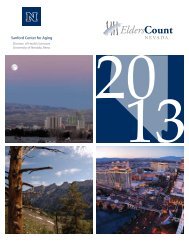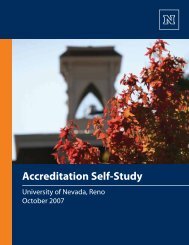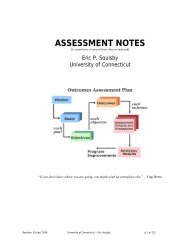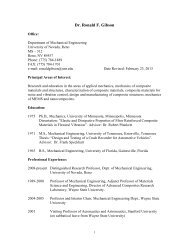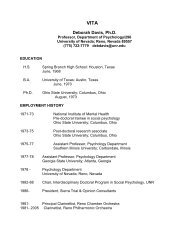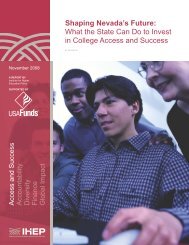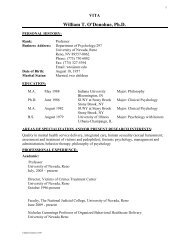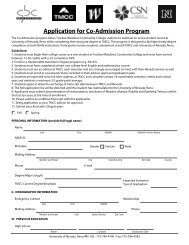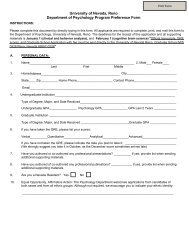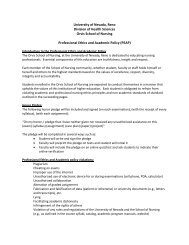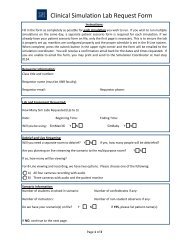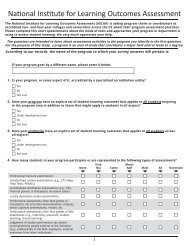College Handbook - University of Nevada, Reno
College Handbook - University of Nevada, Reno
College Handbook - University of Nevada, Reno
Create successful ePaper yourself
Turn your PDF publications into a flip-book with our unique Google optimized e-Paper software.
COLLEGE OF LIBERAL ARTS<br />
SUGGESTED FIRST YEAR COURSES<br />
&<br />
MAJOR PROGRAM REQUIREMENTS
<strong>College</strong> <strong>of</strong> Liberal Arts and Wolf Pack Advising<br />
Welcome to the <strong>College</strong> <strong>of</strong> Liberal Arts and the <strong>University</strong> <strong>of</strong> <strong>Nevada</strong>, <strong>Reno</strong>. We are<br />
excited to have you join the Wolf Pack! We look forward to working with you as you<br />
begin to choose your classes for your first semester at the university.<br />
Academic advising is mandatory for all incoming freshmen. We encourage you to<br />
engage in conversation with your academic advisor to determine the coursework<br />
appropriate for your degree program. This handbook provides suggestions from our<br />
faculty in each department regarding the courses in which you should enroll during<br />
your first two semesters at UNR. An advising hold has been placed on your record,<br />
which will be removed after you have met with an advisor. You will then register for<br />
your classes, beginning at a designated day and time, which is listed in the university<br />
Class Schedule at http://www.ss.unr.edu/records/sched.asp.<br />
Math and English placement is extremely important. Please carefully review your<br />
ACT/SAT scores to determine the proper course in which you should enrolled. We<br />
also encourage you to make a habit <strong>of</strong> reading the course description for each course<br />
you are interested in pursuing, before you enroll in the course. This information is<br />
found in the General Catalog available on-line at<br />
http://www.ss.unr.edu/records/catalog.asp. The course description will also list any<br />
prerequisites that you need to complete before enrolling in a particular course. Be sure<br />
to carefully read through your Wolf Wisdom Info-Pack! As you read this handbook,<br />
you will be instructed to refer back to specific pages in the Wolf Wisdom Info-Pack<br />
for more information.<br />
You have many resources available to you in the <strong>College</strong> <strong>of</strong> Liberal Arts. You will be<br />
assigned an academic advisor in your major area <strong>of</strong> study. Most <strong>of</strong> our programs also<br />
require a minor area <strong>of</strong> study. You will have an additional advisor to discuss your<br />
coursework in pursuit <strong>of</strong> your minor. In addition, the Dean’s <strong>of</strong>fice in the <strong>College</strong> <strong>of</strong><br />
Liberal Arts also houses two full-time advisors to assist you regarding all aspects <strong>of</strong><br />
academic advising. To contact an advisor in the Dean’s <strong>of</strong>fice please call (775)784-<br />
6155 or send us an e-mail at clahelp@unr.nevada.edu. We highly recommend you<br />
meet with your academic advisor at least once a semester. We also encourage you to<br />
subscribe to our <strong>College</strong> <strong>of</strong> Liberal Arts e-newsletter. This newsletter will provide you<br />
with timely information regarding registration, advising updates, and scholarship<br />
information. We also post a number <strong>of</strong> events that the <strong>College</strong> <strong>of</strong> Liberal Arts and the<br />
School <strong>of</strong> the Arts host throughout the year, as well as campus-wide events. If you<br />
would like to subscribe, please send us an e-mail at the address above.<br />
Thank you for joining us. We look forward to seeing you on campus!
Introduction to Liberal Arts Education Course<br />
Fall 2006<br />
LBA 110 Section 001<br />
2 credits<br />
Tuesdays and Thursdays<br />
11:00 – 11:50 am<br />
633 Ansari Business Building<br />
Instructor: Kristi Van Gorder, M.A., Coordinator <strong>of</strong> Advising, Recruitment and<br />
Retention for the <strong>College</strong> <strong>of</strong> Liberal Arts<br />
Call Number: 59322<br />
***Space is limited, so sign up soon!***<br />
This course is designed to introduce you to college study in the liberal arts. We want you to be able to claim your<br />
education, not just have it happen to you. Here is what we expect to happen as a result <strong>of</strong> this class:<br />
-You will develop your own understanding <strong>of</strong> the function <strong>of</strong> a university and the aims <strong>of</strong> a liberal arts education<br />
- You will investigate the discipline in which you plan to major (or explore a range <strong>of</strong> possible liberal arts majors):<br />
what do people in your discipline study, what kinds <strong>of</strong> questions do they ask, what tools and methods do they use,<br />
how do they think, and what sorts <strong>of</strong> jobs or careers do they pursue?<br />
- You will work with classmates to develop an overview <strong>of</strong> resources available on campus for liberal arts students,<br />
along with guidelines for using them.<br />
-You’ll have an opportunity to survey, discuss, and practice the skills necessary to persevere and succeed in collegelevel<br />
work in your chosen major.<br />
- You’ll develop and practice communication and critical thinking techniques through oral and written discussions<br />
<strong>of</strong> current events and a common course text.<br />
- You will have a chance to reflect on your developing identity as a college student, a student <strong>of</strong> the liberal arts, an<br />
educated individual, and a lifelong learner.<br />
What students have said about the course…<br />
“This is a great class and I would strongly recommend it.”<br />
“Thank you for a great semester! This class was awesome.”<br />
“I loved this class!”<br />
If you would like to learn more about this course, please contact Kristi at<br />
kkv@unr.edu or (775)784-6155.
Anthropology<br />
775-784-6704<br />
512 Ansari Business Building<br />
http://www.unr.edu/cla/anthro/phdapp.htm<br />
anthro@unr.nevada.edu<br />
Suggested First Year courses<br />
Semester 1 Semester 2<br />
ENG 101* ENG 102<br />
MATH**<br />
Natural Science Group A<br />
(Core Curriculum see pages 18 – 20)<br />
Foreign Language (111) Foreign Language (112)<br />
Fine Arts (Core Curriculum<br />
see pages 22-23)<br />
Course in minor area and/or<br />
additional Liberal Arts course for<br />
<strong>College</strong> Requirement (See below)<br />
ANTH 101 ANTH 102<br />
* depending on English course placement based on ACT/SAT score; refer to Pg. 16<br />
** depending on Math course placement based on ACT/SAT score; refer to Pg. 16<br />
ANTH 101 INTRODUCTION TO CULTURAL ANTHROPOLOGY (3+1) 3 credits<br />
Introduction to human culture and society. Understanding human diversity through comparative<br />
study <strong>of</strong> politics, religion, economics, and kinship.<br />
ANTH 102 INTRODUCTION TO PHYSICAL ANTHROPOLOGY (3+1) 3 credits<br />
Biological and evolutionary origins <strong>of</strong> humans, with consideration <strong>of</strong> population genetics, living<br />
primates, fossil records and human variation. Includes eight laboratory experiences. Prerequisite:<br />
Core mathematics requirement, or Corequisite: MATH 128 or higher.<br />
Additional Major Program Requirements<br />
• Minor<br />
• Foreign Language<br />
• 2 courses (6 credits) within the <strong>College</strong> <strong>of</strong> Liberal Arts that are outside a student’s<br />
major and minor areas <strong>of</strong> study, and outside the core curriculum
Art<br />
775-784-6682<br />
209 Church Fine Arts Building<br />
http://www.unr.edu/art/home.html<br />
art@unr.nevada.edu<br />
Suggested First Year courses<br />
Semester 1 Semester 2<br />
ENG 101* ENG 102<br />
MATH** Foreign Language (111)****<br />
ART 100 ART 101<br />
ART 260 R ART 261<br />
Introductory Concentration class ***<br />
or Social Science (Core curriculum,<br />
see pages 21-22) or class in minor<br />
area <strong>of</strong> study<br />
Introductory Concentration class ***<br />
or Social Science (Core curriculum,<br />
see pages 21-22) or class in minor<br />
area <strong>of</strong> study<br />
* depending on English course placement based on ACT/SAT score; refer to Pg. 16<br />
** depending on Math course placement based on ACT/SAT score; refer to Pg. 16<br />
***Choice <strong>of</strong> ART 135 R or 211 or 216 or 224 or 231 or 245<br />
****The Foreign Language requirement applies only to students in the Bachelor <strong>of</strong> Arts degree program. Bachelor <strong>of</strong> Fine Arts<br />
students are exempt.<br />
ART 100 VISUAL FOUNDATIONS (1+4) 3 credits<br />
Explores visual forms and contemporary concepts through a variety <strong>of</strong> media, presentations and<br />
discussions.<br />
ART 101 DRAWING I (0+6) 3 credits<br />
Introduction to concepts <strong>of</strong> drawing based on visual observations. (Formerly ART 121;<br />
implemented Fall 2003.)<br />
ART 135 R BEGINNING PHOTOGRAPHY (1+4) 3 credits<br />
Analytical and critical approach to the creative possibilities <strong>of</strong> photography including instruction<br />
in the basics <strong>of</strong> photographic techniques and materials. (Formerly ART 150; implemented Fall<br />
2003.)
ART 211 CERAMICS (1+4) 3 credits<br />
Introduction to ceramics emphasizing characteristics <strong>of</strong> various clay bodies. (Formerly ART<br />
175; implemented Fall 2003.)<br />
ART 216 SCULPTURE I (0+6) 3 credits<br />
Introduction to the concepts <strong>of</strong> three-dimensional composition. (Formerly ART 163;<br />
implemented Fall 2003.)<br />
ART 224 BEGINNING PRINTMAKING: RELIEF (1+4) 3 credits<br />
Lecture/studio instruction in printing woodcuts, linocuts and assembled relief surfaces.<br />
Prerequisite: ART 100, 124. (Formerly ART 280; implemented Fall 2003.)<br />
ART 231 PAINTING I (0+6) 3 credits<br />
Introduction to concepts <strong>of</strong> painting including color, form and composition. Prerequisite: ART<br />
101. (Formerly ART 135; implemented Fall 2003.)<br />
ART 245 DIGITAL MEDICA I (1+4) 3 credits<br />
Introduction to concepts and practices <strong>of</strong> computer art and related media with an emphasis on<br />
contemporary experimental applications. Prerequisite: ART 100 or one studio art course.<br />
Maximum <strong>of</strong> 3 credits. (Formerly ART 260; implemented Fall 2003.)<br />
ART 260 R SURVEY OF ART HISTORY I (3+0) 3 credits<br />
Art <strong>of</strong> the western world from prehistoric times through the Gothic period. (Formerly ART 116;<br />
implemented Fall 2003.)<br />
ART 261 SURVEY OF ART HISTORY II (3+0) 3 credits<br />
Art <strong>of</strong> the western world from the Renaissance to the present. (Formerly ART 117; implemented<br />
Fall 2003.)<br />
Additional Major Program Requirements<br />
• Minor (for all Art major programs)<br />
• Foreign Language (for Bachelor <strong>of</strong> Arts students only)<br />
• 2 courses (6 credits) within the <strong>College</strong> <strong>of</strong> Liberal Arts that are outside a student’s<br />
major and minor areas <strong>of</strong> study, and outside the core curriculum
English<br />
775-784-6689<br />
119 Frandsen Humanities Building<br />
http://www.unr.edu/cla/engl/<br />
Suggested First Year courses<br />
Semester 1 Semester 2<br />
ENG 101* ENG 102<br />
MATH** Foreign Language (112)<br />
Foreign Language (111) Natural Science (Core Curriculum<br />
see pages 18 -20)<br />
Fine Arts or Social Science (Core<br />
Curriculum see pages 21-23)<br />
Fine Arts or Social Science (Core<br />
Curriculum see pages 21-23)<br />
LBA 110 (optional)<br />
Recreation class (PEX 1xx)<br />
* depending on English course placement based on ACT/SAT score; refer to Pg. 16<br />
** depending on Math course placement based on ACT/SAT score; refer to Pg. 16<br />
Additional Major Program Requirements<br />
• Minor<br />
• Foreign Language<br />
• 2 courses (6 credits) within the <strong>College</strong> <strong>of</strong> Liberal Arts that are outside a student’s<br />
major and minor areas <strong>of</strong> study, and outside the core curriculum
Foreign Language<br />
French<br />
775-784-6055<br />
241 EJCH Building<br />
http://www.unr.edu/cla/fll/<br />
fll@unr.nevada.edu<br />
Suggested First Year courses<br />
Semester 1 Semester 2<br />
ENG 101* ENG 102<br />
MATH** FREN 112<br />
Natural Science Group A or B (Core<br />
Curriculum see pages 18 -20)<br />
Natural Science Group A or B (Core<br />
Curriculum see pages 18 -20)<br />
FREN 111***<br />
Fine Arts (Core Curriculum see<br />
Social Science (Core Curriculum see<br />
pages 21-22)<br />
pages 22-23)<br />
Additional Major Program<br />
Requirement (See below)<br />
* depending on English course placement based on ACT/SAT score; refer to Pg.16<br />
** depending on Math course placement based on ACT/SAT score; refer to Pg. 16<br />
***if a beginner. If more advanced, check with advisor for placement in French 112, 211, 212, or 305.<br />
FREN 111-112 FIRST YEAR FRENCH I AND II (4+0) 4 credits each<br />
Introduction to the language through the development <strong>of</strong> language skills and through structural<br />
analysis. Includes an introduction to French culture. (Formerly FR 101-102; 2002)<br />
Additional Major Program Requirements<br />
• Minor<br />
• Foreign Language<br />
• 2 courses (6 credits) within the <strong>College</strong> <strong>of</strong> Liberal Arts that are outside a student’s<br />
major and minor areas <strong>of</strong> study, and outside the core curriculum
Foreign Language<br />
German<br />
775-784-6055<br />
241 EJCH Building<br />
http://www.unr.edu/cla/fll/<br />
fll@unr.nevada.edu<br />
Suggested First Year courses<br />
Semester 1 Semester 2<br />
ENG 101* ENG 102<br />
MATH** GER 112<br />
Natural Science Group A or B (Core<br />
Curriculum see pages 18 -20)<br />
Natural Science Group A or B (Core<br />
Curriculum see pages 18 -20)<br />
GER 111***<br />
Fine Arts (Core Curriculum see<br />
Social Science (Core Curriculum see<br />
pages 21-22)<br />
pages 22-23)<br />
Additional Major Program<br />
Requirement (See below)<br />
* depending on English course placement based on ACT/SAT score; refer to Pg. 16<br />
** depending on Math course placement based on ACT/SAT score; refer to Pg. 16<br />
***if a beginner. If more advanced, check with advisor for placement in German 112, 211, 212, or 305.<br />
GER 111-112 FIRST YEAR GERMAN I AND II (4+0) 4 credits each<br />
Introduction to the language through the development <strong>of</strong> language skills and through structural<br />
analysis. Includes an introduction to German culture. (Formerly GER 101-102; 2002)<br />
Additional Major Program Requirements<br />
• Minor<br />
• Foreign Language<br />
• 2 courses (6 credits) within the <strong>College</strong> <strong>of</strong> Liberal Arts that are outside a student’s<br />
major and minor areas <strong>of</strong> study, and outside the core curriculum
Foreign Language<br />
Spanish<br />
775-784-6055<br />
241 EJCH Building<br />
http://www.unr.edu/cla/fll/<br />
fll@unr.nevada.edu<br />
Suggested First Year courses<br />
Semester 1 Semester 2<br />
ENG 101* ENG 102<br />
MATH**<br />
Fine Arts (Core Curriculum see<br />
pages 22-23)<br />
Natural Science Group A or B (Core<br />
Curriculum see pages 18 -20)<br />
Natural Science Group A or B (Core<br />
Curriculum see pages 18 -20)<br />
SPAN 111*** SPAN 112<br />
Social Science (Core Curriculum see<br />
pages 21-22)<br />
Additional Major Program<br />
Requirement (See below)<br />
* depending on English course placement based on ACT/SAT score; refer to Pg. 16<br />
** depending on Math course placement based on ACT/SAT score; refer to Pg. 16<br />
***if a beginner. If more advanced, check with advisor for placement in Spanish 112, 211, 212, or 305.<br />
SPAN 111-112 FIRST YEAR SPANISH I AND II (4+0) 4 credits each<br />
Introduction to the language through the development <strong>of</strong> language skills and through structural<br />
analysis. Includes an introduction to Spanish and Latin American culture. (Formerly SPAN<br />
101-102; 2002)<br />
Additional Major Program Requirements<br />
• Minor<br />
• Foreign Language<br />
• 2 courses (6 credits) within the <strong>College</strong> <strong>of</strong> Liberal Arts that are outside a student’s<br />
major and minor areas <strong>of</strong> study, and outside the core curriculum
History<br />
775-784-6855<br />
243 Mack Social Science Building<br />
http://www.unr.edu/cla/history<br />
Suggested First Year courses<br />
Semester 1 Semester 2<br />
ENG 101* ENG 102<br />
MATH** Foreign Language (112)<br />
Foreign Language (111) Natural Science (Core Curriculum<br />
see pages 18 – 20)<br />
Social Science (Core Curriculum see Fine Arts (Core Curriculum see<br />
pages 21-22)<br />
First course from HIST 101, 102,<br />
105 or 106***<br />
pages 22-23)<br />
Second course from HIST 101, 102,<br />
105 or 106***<br />
* depending on English course placement based on ACT/SAT score; refer to Pg. 16<br />
** depending on Math course placement based on ACT/SAT score; refer to Pg. 16<br />
***HIST 101 or 105 are recommended before taking HIST 102 or 106; however, HIST 102 or 106 may be taken before HIST<br />
101 or 105. You may wish to consult the History advisor before enrolling in these courses.<br />
HIST 101 UNITED STATES (3+0) 3 credits<br />
U.S. political, social, economic, diplomatic and cultural development from colonial times to<br />
1865. Includes examination <strong>of</strong> the U.S. Constitution and satisfies the U.S. Constitution<br />
requirement.<br />
HIST 102 UNITED STATES (3+0) 3 credits<br />
U.S. political, social, economic, diplomatic and cultural development from 1865 to the present.<br />
HIST 105 EUROPEAN CIVILIZATION (3+0) 3 credits<br />
Development <strong>of</strong> western civilization from the dawn <strong>of</strong> history to 1648.<br />
HIST 106 UNITED STATES (3+0) 3 credits<br />
Development <strong>of</strong> western civilization from 1648 to the present.<br />
Additional Major Program Requirements<br />
• Minor<br />
• Foreign Language<br />
• 2 courses (6 credits) within the <strong>College</strong> <strong>of</strong> Liberal Arts that are outside a student’s<br />
major and minor areas <strong>of</strong> study, and outside the core curriculum
International Affairs<br />
775-784-4601<br />
236 Mack Social Science Building<br />
http://www.unr.edu/cla/polisci/international_affairs.htm<br />
Suggested First Year courses<br />
Semester 1 Semester 2<br />
ENG 101* ENG 102<br />
MATH** Foreign Language (112)<br />
Foreign Language (111)<br />
ECON 102***<br />
Core Curriculum – Natural Science<br />
Core Curriculum – Fine Arts (refer<br />
to Pg. 22-23)<br />
IAFF 100 ECON 102 or 103****<br />
* depending on English course placement based on ACT/SAT score; refer to Pg. 16<br />
** depending on Math course placement based on ACT/SAT score; refer to Pg. 16-17<br />
*** You may take ECON 102 in your first semester IF you have already received credit for MATH 120, or if you are co-enrolled<br />
in MATH 124 or higher. If you are taking MATH 120 your first semester, ECON 102 should be taken in your second semester.<br />
**** If you took ECON 102 your first semester, you may enroll in ECON 103 for the second semester. If you were not eligible<br />
to take ECON 102 your first semester, take ECON 102 in the second semester.<br />
ECON 102 PRINCIPLES OF MICROECONOMICS (3+0) 3 credits<br />
Introductory analysis <strong>of</strong> price determination, resource allocation, market structure, consumer<br />
behavior, producer behavior, market failure and government failure. Economic approaches to<br />
social issues and policy. (Formerly EC 102; implemented Fall 2002.) Prerequisite: MATH 120<br />
or equivalent pr<strong>of</strong>iciency; or corequisite <strong>of</strong> MATH 124 or higher.<br />
ECON 103 PRINCIPLES OF MACROECONOMICS (3+0) 3 credits<br />
Introductory analysis <strong>of</strong> how markets and governments interact to determine an economy’s<br />
output, employment, income, interest rate, wage, price, and trade balance levels over time.<br />
(Formerly EC 101; implemented Fall 2002.) Prerequisite: ECON 102, MATH 120 or equivalent<br />
pr<strong>of</strong>iciency; or corequisite <strong>of</strong> MATH 124 or higher.<br />
IAFF 100 GLOBAL STUDIES (3+0) 3 credits<br />
Introduction to the concepts and methods used to study human interaction and changing modes<br />
<strong>of</strong> interdependence; researching international publications; exploring academic specializations<br />
and career opportunities.<br />
Additional Major Program Requirements
• Minor<br />
• Foreign Language<br />
• 2 courses (6 credits) within the <strong>College</strong> <strong>of</strong> Liberal Arts that are outside a student’s<br />
major and minor areas <strong>of</strong> study, and outside the core curriculum
Interior Design<br />
775-784-1780<br />
521 Ansari Business Building<br />
http://www.unr.edu/interdis/intdesign/<br />
Suggested First Year courses<br />
Semester 1 Semester 2<br />
ENG 101* ENG 102<br />
MATH** ART 101<br />
INTD 151<br />
Natural Science (Core Curriculum<br />
see pages 18 – 20)<br />
PSY 101 AAD 125****<br />
ADT 105/CADD 120B*** CADD 100***** or INTD 216<br />
* depending on English course placement based on ACT/SAT score; refer to Pg. 16<br />
** depending on Math course placement based on ACT/SAT score; refer to Pg. 16<br />
*** ADT 105 <strong>of</strong>fered at Truckee Meadows Community <strong>College</strong>; CADD 120B <strong>of</strong>fered at Western <strong>Nevada</strong> Community <strong>College</strong><br />
**** <strong>of</strong>fered at Truckee Meadows Community <strong>College</strong><br />
***** <strong>of</strong>fered at Truckee Meadows Community <strong>College</strong> or Western <strong>Nevada</strong> Community <strong>College</strong><br />
INTD 151 FOUNDATIONS FOR DESIGN (1+6) 4 credits<br />
Studio study <strong>of</strong> design principles, documents, graphic ideation and modeling; both two-and<br />
three-dimensional aspects are studied.<br />
INTD 216 TEXTILES (3+0) 3 credits<br />
Consumer orientation to textiles. Serviceability, concepts <strong>of</strong> durability, care, comfort and<br />
aesthetic appearance are used to evaluate textile alternatives for various end uses.<br />
TRUCKEE MEADOWS COMMUNITY COLLEGE COURSE DESCRIPTIONS:<br />
ADT 105 ARCHITECTURAL DRAFTING I (5.0 credits)<br />
Basic techniques <strong>of</strong> architectural drafting. Use <strong>of</strong> drafting room equipment. Emphasizes<br />
residential buildings and leads to completion <strong>of</strong> a full set <strong>of</strong> pr<strong>of</strong>essional level working drawings.<br />
Four hours lecture and three hours lab.<br />
AAD 125 CONSTRUCTION DRAWINGS AND DETAILING (3.0 credits)<br />
Analysis <strong>of</strong> assembling and detailing for construction in the field <strong>of</strong> architecture and landscape<br />
architecture. Techniques for the production <strong>of</strong> construction details will be discussed and<br />
demonstrated. Visits to construction sites and pr<strong>of</strong>essional <strong>of</strong>fices.
CADD 100 INTRODUCTION TO COMPUTER-AIDED DRAFTING (3.0-4.0 credits)<br />
Prerequisite: DFT 100 prior to or concurrent with CADD 100. Introduction to the basic<br />
capabilities <strong>of</strong> a Computer Aided Drafting (CAD) system. Includes appropriate terminology,<br />
basic system design, typical hardware and s<strong>of</strong>tware and applicable commands. Students will<br />
draw and solve drafting problems on a CAD system.<br />
WESTERN NEVADA COMMUNITY COLLEGE COURSE DESCRIPTIONS:<br />
CADD 100 INTRODUCTION TO COMPUTER AIDED DRAFTING<br />
3 credits. Prerequisite: recommend DFT 100 and COT 204 or equivalent experience; or consent<br />
<strong>of</strong> instructor; may be taken concurrently.<br />
Uses AutoCAD s<strong>of</strong>tware to produce working drawings. Emphasizes constructing and editing<br />
two-dimensional geometry and placing drawing annotation. Formerly DFT 131.<br />
CADD 120B ARCHITECTURAL DRAFTING I<br />
3 credits. Prerequisite: CADD 100 or equivalent experience.<br />
Stresses blueprint reading skills. Introduces residential working drawing concepts leading to a<br />
full set <strong>of</strong> pr<strong>of</strong>essional level working drawings. Formerly DFT 105B.
Music (Bachelor <strong>of</strong> Arts)<br />
775-784-6145<br />
132 Church Fine Arts Building<br />
http://www.unr.edu/cla/music/<br />
music@unr.nevada.edu<br />
Suggested First Year courses<br />
Fall<br />
Spring<br />
ENG 101* ENG 102<br />
MATH** Foreign Language (111)<br />
MUS 100, MUS 203 and MUS 211 Natural Science (Core Curriculum<br />
see pages 18-20) or Social Science<br />
(Core Curriculum see pages 21-22)<br />
Lower division applied lessons MUS 100, MUS 204 and MUS 212<br />
Ensemble***<br />
Lower division applied lessons, and<br />
Ensemble ***<br />
* depending on English course placement based on ACT/SAT score; refer to Pg. 16<br />
** depending on Math course placement based on ACT/SAT score; refer to Pg. 16<br />
*** choice <strong>of</strong> MUSE 101, MUSE 102, MUSE 112, MUSE 115, or MUSE 121. For information on other ensemble courses,<br />
contact the Music Department.<br />
MUS 100 CONCERT ATTENDANCE (0+1) 0 credits S/U only<br />
Development <strong>of</strong> listening skills through attendance at musical events: music department<br />
concerts, master classes, approved community events.<br />
MUS 203-204 THEORY I AND II (3+0) 3 credits each<br />
Counterpoint and harmony (written and keyboard). Prerequisite for MUS 204 is 203. (Formerly<br />
MUS 207-208; implemented Fall 2004.)<br />
MUS 211-212 SIGHTSINGING AND DICTATION I AND II (0+2) 1 credit (3+0) 3 credits<br />
Solfege and dictation, rhythmic and melodic. (Formerly MUS 209-210; implemented Fall 2004.)<br />
MUSE 101 CONCERT CHOIR (0+3) 1 credit<br />
Performance <strong>of</strong> representative choral music <strong>of</strong> all periods; featured in local concerts and on tour.<br />
Maximum <strong>of</strong> 4 credits. (Formerly MUS 111; implemented Fall 2004.)<br />
MUSE 102 SYMPHONIC CHOIR (0+3) 1 credit<br />
Presentation <strong>of</strong> large-scale choral works. Maximum <strong>of</strong> 6 credits. (Formerly MUS 119;<br />
implemented Fall 2004.)
MUSE 112 SYMPHONIC BAND (0+3) 1 credit<br />
Performance <strong>of</strong> representative literature for large bands. Prerequisite: previous band experience<br />
and audition. Maximum <strong>of</strong> 6 credits. (Formerly MUS 118; implemented Fall 2004.)<br />
MUSE 115 MARCHING BAND (0+3) 1 credit<br />
Marching techniques and performances; performance <strong>of</strong> concert literature (after marching<br />
season). Prerequisite: previous band experience. Maximum <strong>of</strong> 6 credits. (Formerly MUS 117;<br />
implemented Fall 2004.)<br />
MUSE 121 SYMPHONY ORCHESTRA (0+3) 1 credit<br />
One or more concerts <strong>of</strong> representative orchestra literature are given each semester. Maximum<br />
<strong>of</strong> 6 credits. (Formerly MUS 125; implemented Fall 2004.)<br />
Additional Major Program Requirements<br />
• Minor<br />
• Foreign Language<br />
• 2 courses (6 credits) within the <strong>College</strong> <strong>of</strong> Liberal Arts that are outside a student’s<br />
major and minor areas <strong>of</strong> study, and outside the core curriculum
Applied Music (Applied Instrumental)<br />
775-784-6145<br />
132 Church Fine Arts Building<br />
http://www.unr.edu/cla/music/<br />
Suggested First Year courses<br />
Fall<br />
Spring<br />
ENG 101* ENG 102<br />
MATH**<br />
Natural Science (Core Curriculum<br />
see pages 18-20) or Social Science<br />
(Core Curriculum see pages 21-22)<br />
MUS 100, MUS 109, MUS 203 and<br />
211***<br />
MUS 100, MUS 110, MUS 204 and<br />
MUS 212<br />
Lower division applied lessons Lower division applied lessons<br />
Ensemble****<br />
Ensemble****<br />
* depending on English course placement based on ACT/SAT score; refer to Pg. 16<br />
** depending on Math course placement based on ACT/SAT score; refer to Pg. 16<br />
*** MUSA 129 may substitute for MUS 109.<br />
**** Please see the advisor for your specific instrument for assistance in selecting the appropriate ensemble.<br />
MUS 100 CONCERT ATTENDANCE (0+1) 0 credits S/U only<br />
Development <strong>of</strong> listening skills through attendance at musical events: music department<br />
concerts, master classes, approved community events.<br />
MUS 109-110 FUNCTIONAL PIANO I AND II (0+2) 1 credit each<br />
Class instruction for students with limited or no keyboard experience. (Formerly MUS 181-182;<br />
implemented Fall 2004.)<br />
MUS 203-204 THEORY I AND II (3+0) 3 credits each<br />
Counterpoint and harmony (written and keyboard). Prerequisite for MUS 204 is 203. (Formerly<br />
MUS 207-208; implemented Fall 2004.)<br />
MUS 211-212 SIGHTSINGING AND DICTATION I AND II (0+2) 1 credit each (3+0) 3<br />
credits<br />
Solfege and dictation, rhythmic and melodic. (Formerly MUS 209-210; implemented Fall 2004.)
MUSA 129 PIANO—LOWER DIVISION (1/2 OR 1+0) 1 to 4 credits each<br />
Applied music instruction. Prerequisite: competency on instrument (audition—see instructor.)<br />
Maximum <strong>of</strong> 16 credits. (Formerly MUS 151; implemented Fall 2004.)
**PLEASE NOTE: The recommended schedule for this major was revised after the<br />
<strong>College</strong> <strong>Handbook</strong> was initially printed. Please use this version. **<br />
Applied Music (Applied Voice)<br />
775-784-6145<br />
132 Church Fine Arts Building<br />
http://www.unr.edu/cla/music/<br />
Suggested First Year courses<br />
Fall<br />
Spring<br />
ENG 101* ENG 102<br />
MATH**<br />
Core Curriculum - Natural Science<br />
(see pages 18-20) or Social Science<br />
(see pages 21-22)<br />
MUS 100, MUS 109, MUS 203 and MUS 100, MUS 142, MUS 204 and<br />
211***<br />
MUS 212<br />
MUSE 101, MUSE 102, or MUSE MUSA 145, MUSE 101 (or other<br />
103; and MUSE 104<br />
choir) and MUSE 104<br />
MUS 105 and MUS 141<br />
MUS 109 (or private lessons)<br />
* depending on English course placement based on ACT/SAT score; refer to Pg. 16<br />
** depending on Math course placement based on ACT/SAT score; refer to Pg. 16<br />
*** MUSA 165 may substitute for MUS 109.<br />
MUS 100 CONCERT ATTENDANCE (0+1) 0 credits S/U only<br />
Development <strong>of</strong> listening skills through attendance at musical events: music department<br />
concerts, master classes, approved community events.<br />
MUS 105 VOCAL TECHNIQUES (1+2) 2 credits<br />
Fundamentals <strong>of</strong> tone production, breath control, and practical techniques involved in reading<br />
and interpreting songs. Maximum <strong>of</strong> 4 credits. (Formerly MUS 113; implemented Fall 2004.)<br />
MUS 109 FUNCTIONAL PIANO I (0+2) 1 credit<br />
Class instruction for students with limited or no keyboard experience. (Formerly MUS 181;<br />
implemented Fall 2004.)
MUS 141 DICTION I and MUS 142 DICTION II (2+0) 2 credits<br />
Pronunciation <strong>of</strong> foreign languages as used in singing with particular attention to English, Italian,<br />
Latin, German and French. (Formerly MUS 107 and MUS 108; implemented Fall 2004.)<br />
MUS 203 R THEORY I and MUS 204 R THEORY II (3+0) 3 credits<br />
Counterpoint and harmony (written and keyboard). Prerequisite for MUS 204 is 203. (Formerly<br />
MUS 207-208; implemented Fall 2004.)<br />
MUS 211 SIGHTSINGING AND DICTATION I and MUS 212 SIGHTSINGING AND<br />
DICTATION II (0+2) 1 credit<br />
Solfege and dictation, rhythmic and melodic. (Formerly MUS 209 and MUS 210; implemented<br />
Fall 2004.)<br />
MUSA 129 PIANO—LOWER DIVISION (1/2 OR 1+0) 1 to 4 credits each<br />
Applied music instruction. Prerequisite: competency on instrument (audition—see instructor.)<br />
Maximum <strong>of</strong> 16 credits. (Formerly MUS 151; implemented Fall 2004.)<br />
MUSA 145 VOICE—LOWER DIVISION (1/2 OR 1+0) 1 to 3 credits each<br />
Applied music instruction. Maximum <strong>of</strong> 12 credits. (Formerly MUS 153; implemented Fall<br />
2004.) Prerequisite: competency on instrument (audition—see instructor.)<br />
MUSE 101 CONCERT CHOIR (0+3) 1 credit<br />
Performance <strong>of</strong> representative choral music <strong>of</strong> all periods; featured in local concerts and on tour.<br />
Maximum <strong>of</strong> 4 credits. (Formerly MUS 111; implemented Fall 2004.)<br />
MUSE 102 SYMPHONIC CHOIR (0+3) 1 credit<br />
Presentation <strong>of</strong> large-scale choral works. Maximum <strong>of</strong> 6 credits. (Formerly MUS 119;<br />
implemented Fall 2004.)<br />
MUSE 103 CHAMBER CHORALE (0+2) 1 credit<br />
Performance <strong>of</strong> choral chamber music literature. Prerequisite: audition. Maximum <strong>of</strong> 6 credits.<br />
(Formerly MUS 205; implemented Fall 2004.)<br />
MUSE 104 OPERA WORKSHOP (0+2) 1 credit<br />
Beginning music theatre techniques for singers, pianist-coaches, stage directors, including<br />
production and performance. Maximum <strong>of</strong> 4 credits. (Formerly MUS 270; implemented Fall<br />
2004.)
Applied Music (Jazz Studies Emphasis)<br />
775-784-6145<br />
132 Church Fine Arts Building<br />
http://www.unr.edu/cla/music/<br />
Suggested First Year courses—For students entering in the<br />
fall <strong>of</strong> an odd-numbered year (2007, 2009, etc.)<br />
Fall<br />
Spring<br />
ENG 101* ENG 102<br />
MATH**<br />
Natural Science (Core Curriculum<br />
see pages 18-20) or Social Science<br />
(Core Curriculum see pages 21-22)<br />
MUS 100, MUS 109R, MUS 203R, MUS 100, MUS 110R, MUS 122R,<br />
MUS 211, MUS 217 and applied MUSE 204R and MUS 212<br />
lessons (2 credits)***<br />
MUSE 131 and MUSE 133<br />
Other ensembles/electives (1-2<br />
credits)<br />
Lower division applied lessons<br />
Ensembles (MUSE 131 and MUSE<br />
133), elective ensemble<br />
* depending on English course placement based on ACT/SAT score; refer to Pg. 16<br />
** depending on Math course placement based on ACT/SAT score; refer to Pg. 16<br />
*** MUSA 129 may substitute for MUS 109. MUS 109/110 required for non-keyboard majors ONLY.<br />
MUS 100 CONCERT CLASS (0+1) 0 credits S/U only<br />
Development <strong>of</strong> listening skills through attendance at musical events: music department<br />
concerts, master classes, approved community events. May be repeated.<br />
MUS 109R-110R FUNCTIONAL PIANO I AND II (0+2) 1 credit each<br />
Class instruction for students with limited or no keyboard experience. (Formerly MUS 181-182;<br />
implemented Fall 2004.)<br />
MUS 122R SURVEY OF JAZZ (3+0) 3 credits<br />
Chronological study <strong>of</strong> jazz music and musicians with emphasis on directed learning. (Formerly<br />
MUS 120; implemented Fall 2004.)<br />
MUS 203R-204R MUSIC THEORY I AND II (3+0) 3 credits each<br />
Counterpoint and harmony (written and keyboard). (Formerly MUS 207-208; implemented Fall<br />
2004.)
MUS 211-212 SIGHTSINGING AND DICTATION I AND II (0+2) 1 credit each<br />
Solfege and dictation, rhythmic and melodic. (Formerly MUS 209-210; implemented Fall 2004.)<br />
MUS 217 JAZZ RHYTHM THEORY (1+0) 1 credit<br />
Exploration <strong>of</strong> various rhythmic components <strong>of</strong> jazz music. Lecture/demonstrations will focus<br />
on African American, Sub-Saharan African, Afro-Cuban, Brazilian, and Balkan music cultures.<br />
MUSA 129 PIANO—LOWER DIVISION (1/2 OR 1+0) 1 to 4 credits<br />
Applied music instruction. Prerequisite: competency on instrument (audition—see instructor.)<br />
Maximum <strong>of</strong> 16 credits. (Formerly MUS 151; implemented Fall 2004.)<br />
MUSE 131 JAZZ ENSEMBLE (0+2) 1 credit<br />
Performing ensemble specializing in traditional and contemporary big band jazz literature.<br />
Maximum <strong>of</strong> 6 credits.<br />
MUSE 133 JAZZ COMBO (0+2) 1 credit<br />
Performing ensemble emphasizing improvisation in a small group context. Maximum <strong>of</strong> 8<br />
credits. (Formerly MUS 235; implemented Fall 2004.)
**PLEASE NOTE: The recommended schedule for this major was revised after the<br />
<strong>College</strong> <strong>Handbook</strong> was initially printed. Please use this version. **<br />
Music Education (Instrumental)<br />
775-784-6145<br />
132 Church Fine Arts Building<br />
http://www.unr.edu/cla/music/<br />
Suggested First Year courses—For students entering in the<br />
fall <strong>of</strong> an odd-numbered year (2007, 2009, etc.)<br />
Fall<br />
Spring<br />
ENG 101* ENG 102<br />
MATH**<br />
MUS 100, MUS 110R, MUS 204R<br />
and MUS 212<br />
MUS 100, MUS 109R, MUS 203R<br />
and MUS 211***<br />
Natural Science (Core Curriculum<br />
see pages 18-20)<br />
Lower-Division Applied Lessons (2<br />
credits)****<br />
Lower-Division Applied Lessons (2<br />
credits)****<br />
Ensemble*****<br />
Ensemble*****<br />
* depending on English course placement based on ACT/SAT score; refer to Pg. 16<br />
** depending on Math course placement based on ACT/SAT score; refer to Pg. 16<br />
*** Optional, in addition to MUS 100, 203R and 211: MUS 109R or private lessons, MUSA 129<br />
**** examples: MUSA 101, 103, 105, 107, 109, 111, 113, 115, 117, 121, 123, 127, 129, 131, 135, 137, 139, 141 or 143.<br />
*****Please see your Applied Lesson instructor or contact your specific music advisor for advice on the appropriate ensemble.<br />
Wind & Percussion music education majors must complete a minimum <strong>of</strong> two semesters <strong>of</strong> MUSE 115, Marching Band.<br />
MUS 100 CONCERT ATTENDANCE (0+1) 0 credits S/U only<br />
Development <strong>of</strong> listening skills through attendance at musical events: music department<br />
concerts, master classes, approved community events.<br />
MUS 109R-110R FUNCTIONAL PIANO I AND II (0+2) 1 credit each<br />
Class instruction for students with limited or no keyboard experience. (Formerly MUS 181-182;<br />
implemented Fall 2004.)<br />
MUS 203R-204R MUSIC THEORY I AND II (3+0) 3 credits each<br />
Counterpoint and harmony (written and keyboard). (Formerly MUS 207-208; implemented Fall<br />
2004.)
MUS 211-212 SIGHTSINGING AND DICTATION I AND II (0+2) 1 credit each<br />
Solfege and dictation, rhythmic and melodic. (Formerly MUS 209-210; implemented Fall 2004.)<br />
MUSA 101 BASS—LOWER DIVISION (1/2 OR 1+0) 1 to 4 credits each<br />
Applied music instruction. Prerequisite: competency on instrument (audition—see instructor.)<br />
Maximum <strong>of</strong> 16 credits. (Formerly MUS 159; implemented Fall 2004.)<br />
MUSA 103 BASSOON—LOWER DIVISION (1/2 OR 1+0) 1 to 4 credits each<br />
Applied music instruction. Prerequisite: competency on instrument (audition—see instructor.)<br />
Maximum <strong>of</strong> 16 credits. (Formerly MUS 157; implemented Fall 2004.)<br />
MUSA 105 CELLO—LOWER DIVISION (1/2 OR 1+0) 1 to 4 credits each<br />
Applied music instruction. Prerequisite: competency on instrument (audition—see instructor.)<br />
Maximum <strong>of</strong> 16 credits. (Formerly MUS 159; implemented Fall 2004.)<br />
MUSA 107 CLARINET—LOWER DIVISION (1/2 OR 1+0) 1 to 4 credits each<br />
Applied music instruction. Prerequisite: competency on instrument (audition—see instructor.)<br />
Maximum <strong>of</strong> 16 credits. (Formerly MUS 157; implemented Fall 2004.)<br />
MUSA 109 DRUM SET—LOWER DIVISION (1/2 OR 1+0) 1 to 4 credits each<br />
Applied music instruction. Prerequisite: competency on instrument (audition—see instructor.)<br />
Maximum <strong>of</strong> 16 credits. (Formerly MUS 161; implemented Fall 2004.)<br />
MUSA 111 EUPHONIUM—LOWER DIVISION (1/2 OR 1+0) 1 to 4 credits each<br />
Applied music instruction. Prerequisite: competency on instrument (audition—see instructor.)<br />
Maximum <strong>of</strong> 16 credits. (Formerly MUS 155; implemented Fall 2004.)<br />
MUSA 113 FLUTE—LOWER DIVISION (1/2 OR 1+0) 1 to 4 credits each<br />
Applied music instruction. Prerequisite: competency on instrument (audition—see instructor.)<br />
Maximum <strong>of</strong> 16 credits. (Formerly MUS 157; implemented Fall 2004.)<br />
MUSA 115 GUITAR—LOWER DIVISION (1/2 OR 1+0) 1 to 4 credits each<br />
Applied music instruction. Prerequisite: competency on instrument (audition—see instructor.)<br />
Maximum <strong>of</strong> 16 credits. (Formerly MUS 159; implemented Fall 2004.)<br />
MUSA 117 HARP—LOWER DIVISION (1/2 OR 1+0) 1 to 4 credits each<br />
Applied music instruction. Prerequisite: competency on instrument (audition—see instructor.)<br />
Maximum <strong>of</strong> 16 credits. (Formerly MUS 159; implemented Fall 2004.)<br />
MUSA 121 HORN—LOWER DIVISION (1/2 OR 1+0) 1 to 4 credits each<br />
Applied music instruction. Prerequisite: competency on instrument (audition—see instructor.)<br />
Maximum <strong>of</strong> 16 credits. (Formerly MUS 155; implemented Fall 2004.)
MUSA 123 OBOE—LOWER DIVISION (1/2 OR 1+0) 1 to 4 credits each<br />
Applied music instruction. Prerequisite: competency on instrument (audition—see instructor.)<br />
Maximum <strong>of</strong> 16 credits. (Formerly MUS 157; implemented Fall 2004.)<br />
MUSA 127 PERCUSSION—LOWER DIVISION (1/2 OR 1+0) 1 to 4 credits each<br />
Applied music instruction. Prerequisite: competency on instrument (audition—see instructor.)<br />
Maximum <strong>of</strong> 16 credits. (Formerly MUS 163; implemented Fall 2004.)<br />
MUSA 129 PIANO—LOWER DIVISION (1/2 OR 1+0) 1 to 4 credits each<br />
Applied music instruction. Prerequisite: competency on instrument (audition—see instructor.)<br />
Maximum <strong>of</strong> 16 credits. (Formerly MUS 151; implemented Fall 2004.)<br />
MUSA 131 SAXOPHONE—LOWER DIVISION (1/2 OR 1+0) 1 to 4 credits each<br />
Applied music instruction. Prerequisite: competency on instrument (audition—see instructor.)<br />
Maximum <strong>of</strong> 16 credits. (Formerly MUS 157; implemented Fall 2004.)<br />
MUSA 135 TROMBONE—LOWER DIVISION (1/2 OR 1+0) 1 to 4 credits each<br />
Applied music instruction. Prerequisite: competency on instrument (audition—see instructor.)<br />
Maximum <strong>of</strong> 16 credits. (Formerly MUS 155; implemented Fall 2004.)<br />
MUSA 137 TRUMPET—LOWER DIVISION (1/2 OR 1+0) 1 to 4 credits each<br />
Applied music instruction. Prerequisite: competency on instrument (audition—see instructor.)<br />
Maximum <strong>of</strong> 16 credits. (Formerly MUS 155; implemented Fall 2004.)<br />
MUSA 139 TUBA—LOWER DIVISION (1/2 OR 1+0) 1 to 4 credits each<br />
Applied music instruction. Prerequisite: competency on instrument (audition—see instructor.)<br />
Maximum <strong>of</strong> 16 credits. (Formerly MUS 155; implemented Fall 2004.)<br />
MUSA 141 VIOLA—LOWER DIVISION (1/2 OR 1+0) 1 to 4 credits each<br />
Applied music instruction. Prerequisite: competency on instrument (audition—see instructor.)<br />
Maximum <strong>of</strong> 16 credits. (Formerly MUS 159; implemented Fall 2004.)<br />
MUSA 143 VIOLIN—LOWER DIVISION (1/2 OR 1+0) 1 to 4 credits each<br />
Applied music instruction. Prerequisite: competency on instrument (audition—see instructor.)<br />
Maximum <strong>of</strong> 16 credits. (Formerly MUS 159; implemented Fall 2004.)<br />
MUSE 101 CONCERT CHOIR (0+3) 1 credit<br />
Performance <strong>of</strong> representative choral music <strong>of</strong> all periods; featured in local concerts and on tour.<br />
Maximum <strong>of</strong> 4 credits. (Formerly MUS 111; implemented Fall 2004.)<br />
MUSE 114 WIND ENSEMBLE (0+3) 1 credit<br />
Performance <strong>of</strong> representative literature for chamber winds. Prerequisite: previous band<br />
experience and audition. Maximum <strong>of</strong> 6 credits. (Formerly MUS 118; implemented Fall 2004.)
MUSE 115 MARCHING BAND (0+3) 1 credit<br />
Marching techniques and performances; performance <strong>of</strong> concert literature (after marching<br />
season). Prerequisite: previous band experience. Maximum <strong>of</strong> 6 credits. (Formerly MUS 117;<br />
implemented Fall 2004.)<br />
MUSE 121 SYMPHONY ORCHESTRA (0+3) 1 credit<br />
One or more concerts <strong>of</strong> representative orchestra literature are given each semester. Maximum<br />
<strong>of</strong> 6 credits. (Formerly MUS 125; implemented Fall 2004.)
**PLEASE NOTE: The recommended schedule for this major was revised after the<br />
<strong>College</strong> <strong>Handbook</strong> was initially printed. Please use this version. **<br />
Music Education (Vocal)<br />
775-784-6145<br />
132 Church Fine Arts Building<br />
http://www.unr.edu/cla/music/<br />
Suggested First Year courses—For students entering in the<br />
fall <strong>of</strong> an odd-numbered year (2007, 2009, etc.)<br />
Fall<br />
Spring<br />
ENG 101* ENG 102<br />
MATH**<br />
MUS 100, MUS 110R, MUS 204R<br />
and MUS 212<br />
MUS 100, MUS 109R, MUS 203R<br />
and MUS 211***<br />
Natural Science (Core Curriculum<br />
see pages 18-20)<br />
MUSE 101 or 103**** MUSE 101 or 103<br />
MUS 105 and MUS 141 MUS 142<br />
COM 113<br />
Lower-division applied lessons<br />
* depending on English course placement based on ACT/SAT score; refer to Pg. 16<br />
** depending on Math course placement based on ACT/SAT score; refer to Pg. 16<br />
*** Optional, in addition to MUS 100, 203R and 211: MUS 109 or private lessons, MUSA 129<br />
**** Optional, in addition to MUSE 101 or 103: MUSE 104 and/or 135<br />
MUS 100 CONCERT ATTENDANCE (0+1) 0 credits S/U only<br />
Development <strong>of</strong> listening skills through attendance at musical events: music department<br />
concerts, master classes, approved community events.<br />
MUS 105 VOCAL TECHNIQUES (1+2) 2 credits<br />
Fundamentals <strong>of</strong> tone production, breath control, and practical techniques involved in reading<br />
and interpreting songs. Maximum <strong>of</strong> 4 credits. (Formerly MUS 113; implemented Fall 2004.)<br />
MUS 109R FUNCTIONAL PIANO I (0+2) 1 credit<br />
Class instruction for students with limited or no keyboard experience. (Formerly MUS 181;<br />
implemented Fall 2004.)
MUS 203R-204R MUSIC THEORY I AND II (3+0) 3 credits each<br />
Counterpoint and harmony (written and keyboard). (Formerly MUS 207-208; implemented Fall<br />
2004.)<br />
MUS 211 SIGHTSINGING AND DICTATION I (0+2) 1 credit<br />
Solfege and dictation, rhythmic and melodic. (Formerly MUS 209; implemented Fall 2004.)<br />
MUSA 129 PIANO—LOWER DIVISION (1/2 OR 1+0) 1 to 4 credits each<br />
Applied music instruction. Prerequisite: competency on instrument (audition—see instructor.)<br />
Maximum <strong>of</strong> 16 credits. (Formerly MUS 151; implemented Fall 2004.)<br />
MUSE 101 CONCERT CHOIR (0+3) 1 credit<br />
Performance <strong>of</strong> representative choral music <strong>of</strong> all periods; featured in local concerts and on tour.<br />
Maximum <strong>of</strong> 4 credits. (Formerly MUS 111; implemented Fall 2004.)<br />
MUSE 103 CHAMBER CHORALE (0+2) 1 credit<br />
Performance <strong>of</strong> choral chamber music literature. Prerequisite: audition. Maximum <strong>of</strong> 6 credits.<br />
(Formerly MUS 205; implemented Fall 2004.)<br />
MUSE 104 OPERA WORKSHOP (0+2) 1 credit<br />
Beginning music theatre techniques for singers, pianist-coaches, stage directors, including<br />
production and performance. Maximum <strong>of</strong> 4 credits. (Formerly MUS 270; implemented Fall<br />
2004.)<br />
MUSE 135 JAZZ VOCAL ENSEMBLE (0+2) 1 credit<br />
Performance <strong>of</strong> jazz vocal music literature. Prerequisite: audition. Maximum <strong>of</strong> 6 credits.<br />
(Formerly MUS 205; implemented Fall 2004.)
Philosophy<br />
775-784-6846<br />
108 EJCH Building<br />
http://www.unr.edu/philosophy/<br />
philosophy@unr.nevada.edu<br />
Suggested First Year courses<br />
Semester 1 Semester 2<br />
ENG 101* ENG 102<br />
MATH** Foreign Language (112)<br />
Natural Science (Core Curriculum<br />
see pages 18-20) or Social Science<br />
(Core Curriculum see pages 21-22)<br />
Two Philosophy courses ***; OR<br />
one Philosophy course and Foreign<br />
Language (111)<br />
Fine Arts (Core Curriculum see<br />
pages 22-23)****<br />
Natural Science (Core Curriculum<br />
see pages 18-20)<br />
Social Science (Core Curriculum see<br />
pages 21-22)*****<br />
PEX (Physical Education) elective<br />
(optional)<br />
* depending on English course placement based on ACT/SAT score; refer to Pg. 16<br />
** depending on Math course placement based on ACT/SAT score; refer to Pg. 16<br />
***PHIL 114, 131, 135, 202, 203, 207, 211, 213, 224, 244, 245, 281 OR 282. All 100- and 200-level philosophy courses are<br />
considered to be introductory, and do not require prerequisites.<br />
****PHIL 202 from the list above also fulfills the Core Curriculum Fine Arts requirement.<br />
*****If Social Science was not already taken in Semester 1, it may be taken in Semester 2. If Social Science was already taken<br />
in Semester 1, then additional Philosophy course or course for Additional Major Program Requirements (see below) may be<br />
taken in Semester 2.<br />
PHIL 114 INTRODUCTION TO SYMBOLIC LOGIC (3+0) 3 credits<br />
Principles <strong>of</strong> correct reasoning, using modern symbolic techniques <strong>of</strong> the propositional calculus<br />
and simple quantification theory.<br />
PHIL 131 INTRODUCTION TO METAPHYSICS (3+0) 3 credits<br />
Selected problems concerning human nature and reality, e.g., mind and body, freedom and<br />
determinism, space and time, God, causality. (Formerly PHIL 130)<br />
PHIL 135 INTRODUCTION TO ETHICS (3+0) 3 credits<br />
Issues concerning happiness and morality, e.g., friendship, pleasure, virtue, body vs. soul,<br />
individual vs. society, nonconformity, constraints on pursuit <strong>of</strong> good, moral conflict, beyond<br />
morality. (Formerly PHIL 125)
PHIL 202 INTRODUCTION TO THE PHILOSOPHY OF THE ARTS (3+0) 3 credits<br />
Varieties <strong>of</strong> artistic representation and expression, the relationship <strong>of</strong> artworks to their<br />
embodiments, and the nature <strong>of</strong> interpretation and aesthetic response.<br />
PHIL 203 INTRODUCTION TO EXISTENTIALISM (3+0) 3 credits<br />
Readings from Kierkegaard, Nietzsche, Jaspers, Sartre, Heidegger. An examination <strong>of</strong> the<br />
existentialist concepts: “being” and “nonbeing,” “estrangement,” “dread,” “anxiety” and<br />
“freedom.”<br />
PHIL 207 INTRODUCTION TO SOCIAL AND POLITICAL PHILOSOPHY (3+0) 3<br />
credits<br />
Major political philosophers, e.g., Plato, Aristotle, Machiavelli, Hobbes, Rousseau, Mill, Marx,<br />
on topics such as justice, freedom, equality, tyranny, war, racism, sexism, power, consent,<br />
economics. (Same as PSC 227.)<br />
PHIL 211 INTRODUCTION TO ANCIENT PHILOSOPHY (3+0) 3 credits<br />
Major thinkers from the sixth through the second century B.C.E., e.g., the pre-Socrates, Socrates,<br />
the sophists, Plato, Aristotle, the atomists, cynics, skeptics, stoics and Epicureans.<br />
PHIL 213 INTRODUCTION TO MODERN PHILOSOPHY (3+0) 3 credits<br />
Major thinkers from the Renaissance through the 18 th century, e.g., Bacon, Hobbes, Descartes,<br />
Spinoza, Leibniz, Locke, Berkeley, Hume and Kant.<br />
PHIL 224 INTRODUCTION TO PHILOSOPHY OF SCIENCE (3+0) 3 credits<br />
Philosophical problems and implications <strong>of</strong> historical and contemporary scientific inquiry, e.g.,<br />
the nature <strong>of</strong> laws, theories, explanations, scientific revolutions, values, relations <strong>of</strong> science and<br />
society.<br />
PHIL 244 BIOETHICS (3+0) 3 credits<br />
Treatment <strong>of</strong> such issues as abortion and euthanasia, cloning, genetic screening, just health care,<br />
patients’ rights, the use <strong>of</strong> human and animal subjects in research.<br />
PHIL 245 CONTEMPORARY MORAL ISSUES (3+0) 3 credits<br />
Topical questions in practical ethics, e.g., war and terrorism, world hunger, abortion, racial<br />
discrimination, gender roles, the environment from a multicultural perspective. (Diversity<br />
course.)<br />
PHIL 281 INTRODUCTION TO THE HISTORY OF SCIENCE I (3+0) 3 credits<br />
History <strong>of</strong> the physical, mathematical, natural, biological and medical sciences from the ancient<br />
world to the Scientific Revolution <strong>of</strong> the 17 th century.<br />
PHIL 282 INTRODUCTION TO THE HISTORY OF SCIENCE II (3+0) 3 credits<br />
History <strong>of</strong> the physical, mathematical, natural, biological and medical sciences from the 17 th<br />
century to the present.
Additional Major Program Requirements<br />
• Minor<br />
• Foreign Language<br />
• 2 courses (6 credits) within the <strong>College</strong> <strong>of</strong> Liberal Arts that are outside a student’s<br />
major and minor areas <strong>of</strong> study, and outside the core curriculum
Political Science<br />
775-784-4601<br />
236 Mack Social Science Building<br />
http://www.unr.edu/cla/polisci/<br />
Suggested First Year courses<br />
Semester 1 Semester 2<br />
ENG 101* ENG 102<br />
MATH** Foreign Language (111)<br />
PSC 101 or 103<br />
Natural Science (Core Curriculum<br />
see pages 18-20)<br />
Fine Arts (Core Curriculum see Additional Major Program<br />
pages 22-23)<br />
PSC 211, 227 or 231<br />
Requirement (see below)<br />
PEX (Physical Education) elective<br />
(optional)<br />
* depending on English course placement based on ACT/SAT score; refer to Pg. 16<br />
** depending on Math course placement based on ACT/SAT score; refer to Pg. 16<br />
PSC 101 AMERICAN POLITICS: PROCESS AND BEHAVIOR (3+0) 3 credits<br />
American government and the discipline <strong>of</strong> political science; surveys participation, pursuit and<br />
use <strong>of</strong> power, and contemporary political issues. Satisfies the U.S. Constitution requirement.<br />
Credit not allowed in both PSC 101, 103.<br />
PSC 103 PRINCIPLES OF AMERICAN CONSTITUTIONAL GOVERNMENT (3+0) 3<br />
credits<br />
Constitution <strong>of</strong> the United States and <strong>Nevada</strong> with additional attention to various principles and<br />
current problems. Satisfies the United States and <strong>Nevada</strong> Constitution requirements. (Offered<br />
through correspondence division only).<br />
PSC 211 COMPARATIVE GOVERNMENT AND POLITICS (3+0) 3 credits<br />
Analysis <strong>of</strong> similarities and differences in the governing processes <strong>of</strong> different societies.<br />
PSC 227 INTRODUCTION TO POLITICAL PHILSOPHY (3+0) 3 credits<br />
Major political philosophers, e.g., Plato, Aristotle, Machiavelli, Hobbes, Rousseau, Mill, Marx,<br />
on topics such as justice, freedom, equality, tyranny, war, racism, sexism, power, consent,<br />
economics.
PSC 231 WORLD POLITICS (3+0) 3 credits<br />
Introduction to the study <strong>of</strong> international relations. Explores policy making institutions, foreign<br />
policies and politics <strong>of</strong> various nations.<br />
Additional Major Program Requirements<br />
• Minor<br />
• Foreign Language<br />
• 2 courses (6 credits) within the <strong>College</strong> <strong>of</strong> Liberal Arts that are outside a student’s<br />
major and minor areas <strong>of</strong> study, and outside the core curriculum
Psychology<br />
775-784-6828<br />
438 Mack Social Science Building<br />
http://www.unr.edu/psych<br />
psyvice@scs.unr.edu<br />
Suggested First Year courses<br />
Semester 1 Semester 2<br />
ENG 101* ENG 102<br />
MATH** Foreign Language (112)<br />
PSY 101 (see descriptions below) or<br />
103<br />
Natural Science (Core Curriculum<br />
see pages 18-20)<br />
Foreign Language (111) PSY 210<br />
Optional courses****<br />
Optional courses****<br />
* depending on English course placement based on ACT/SAT score; refer to Pg. #<br />
** depending on Math course placement based on ACT/SAT score; refer to Pg. #<br />
***Core Curriculum Fine Arts course (see pages 22-23), or an additional Social Science course (see pages 21-22), or a course in<br />
your minor area <strong>of</strong> study, or a 1-credit PEX (physical educations) course, or the 2-credit LBA 110 (Introduction to Liberal Arts<br />
Education) course.<br />
PSY 101 GENERAL PSYCHOLOGY (3+0) 3 credits<br />
Presents psychology as a science concerned with the actions <strong>of</strong> organisms in a social and cultural<br />
context.<br />
Sections 001-005 utilize a self-paced, mastery model consisting <strong>of</strong> frequent quizzing and<br />
discussion sessions. Students are enabled to progress through the course faster (mid-semester)<br />
than a normal pace (the end <strong>of</strong> one semester). Discussion sessions are <strong>of</strong>fered five days a week,<br />
12 hours per day by advanced graduate students to accommodate each student’s schedule.<br />
Sections 006-014 use the traditional method <strong>of</strong> instruction consisting <strong>of</strong> formal lectures taught by<br />
a faculty member in the Department <strong>of</strong> Psychology on Mondays and Wednesdays. Small<br />
discussion classes are <strong>of</strong>fered on Thursdays or Fridays (as indicated in the course schedule) by<br />
an advanced graduate student. Since this approach is based on the traditional method in college<br />
teaching, further elaboration is not necessary.<br />
PSY 103 INTRODUCTION TO PSYCHOLOGY AS A NATURAL SCIENCE (2+2) 3<br />
credits<br />
Measurement <strong>of</strong> actions <strong>of</strong> individual biological organisms acting in and upon an environment.
PSY 210 STATISTICAL METHODS (3+0) 3 credits<br />
Practice with statistical methods especially useful in the presentation and interpretation <strong>of</strong><br />
psychological, sociological and educational data. Prerequisite: PSY 101 or 103; must have<br />
completed the university core requirements for mathematics.<br />
Additional Major Program Requirements<br />
• Minor<br />
• Foreign Language<br />
• 2 courses (6 credits) within the <strong>College</strong> <strong>of</strong> Liberal Arts that are outside a student’s<br />
major and minor areas <strong>of</strong> study, and outside the core curriculum
Sociology<br />
775-784-6647<br />
300 Mack Social Science Building<br />
http://www.unr.edu/cla/soc<br />
soc@unr.nevada.edu<br />
Suggested First Year courses<br />
Semester 1 Semester 2<br />
ENG 101* ENG 102<br />
MATH** Foreign Language (112)<br />
Core Curriculum – Natural Science<br />
or Fine Arts (see pages 18-20 and<br />
22-23)<br />
Core Curriculum – Natural Science<br />
(see pages 18-20) or Additional<br />
Major Program Requirement (see<br />
below)<br />
Foreign Language (111) SOC 207 or SOC 210<br />
SOC 101<br />
PEX elective (optional)<br />
* depending on English course placement based on ACT/SAT score; refer to Pg. 16<br />
** depending on Math course placement based on ACT/SAT score; refer to Pg. 16<br />
SOC 101 PRINCIPLES OF SOCIOLOGY (3+0) 3 credits<br />
Sociological principles underlying the development, structure and function <strong>of</strong> culture, society,<br />
human groups, personality formation and social change.<br />
SOC 207 INTRODUCTION TO SOCIOLOGICAL THEORY (3+0) 3 credits<br />
Examination <strong>of</strong> the works <strong>of</strong> classical and contemporary social theorists <strong>of</strong> the 19 th and 20 th<br />
centuries. Prerequisite: SOC 101.<br />
SOC 210 INTRODUCTION TO STATISTICAL METHODS (3+0) 4 credits<br />
Statistical methods applicable to the analysis, interpretation, and presentation <strong>of</strong> sociological<br />
data. Prerequisite: SOC 101; must have completed the university core requirements for<br />
mathematics.<br />
Additional Major Program Requirements<br />
• Minor<br />
• Foreign Language<br />
• 2 courses (6 credits) within the <strong>College</strong> <strong>of</strong> Liberal Arts that are outside a student’s<br />
major and minor areas <strong>of</strong> study, and outside the core curriculum
Speech Communication<br />
775-784-6839<br />
155 Church Fine Arts Building<br />
http://www.unr.edu/cla/spth/<br />
Suggested First Year courses<br />
Semester 1 Semester 2<br />
ENG 101* ENG 102<br />
MATH** Foreign Language (112)<br />
Social Science (Core Curriculum see Fine Arts (Core Curriculum see<br />
pages 21-22)<br />
Foreign Language (111)<br />
pages 22-23)<br />
Natural Science (Core Curriculum<br />
see pages 18-20)<br />
100-level Core Curriculum COM 216<br />
* depending on English course placement based on ACT/SAT score; refer to Pg. 16<br />
** depending on Math course placement based on ACT/SAT score; refer to Pg. 16<br />
COM 216 SURVEY OF COMMUNICATION STUDIES (3+0) 3 credits<br />
Survey <strong>of</strong> theories <strong>of</strong> human communication; study <strong>of</strong> the nature <strong>of</strong> speech communication<br />
process.<br />
Additional Major Program Requirements<br />
• Minor<br />
• Foreign Language<br />
• 2 courses (6 credits) within the <strong>College</strong> <strong>of</strong> Liberal Arts that are outside a student’s<br />
major and minor areas <strong>of</strong> study, and outside the core curriculum
Theatre<br />
775-784-6839<br />
155 Church Fine Arts Building<br />
http://www.unr.edu/cla/spth/<br />
Suggested First Year courses<br />
Semester 1 Semester 2<br />
ENG 101* ENG 102<br />
MATH** Foreign Language (112)***<br />
Social Science (Core Curriculum see<br />
pages 21-22)<br />
Natural Science (Core Curriculum<br />
see pages 18-20)<br />
Foreign Language (111)*** THTR 204 and/or THTR 208****<br />
THTR 100 or THTR 105<br />
Electives (optional)****<br />
* depending on English course placement based on ACT/SAT score; refer to Pg. 16<br />
** depending on Math course placement based on ACT/SAT score; refer to Pg. 16<br />
***The Foreign Language requirement applies only to students in the Bachelor <strong>of</strong> Arts degree program. Bachelor <strong>of</strong> Fine Arts<br />
students are exempt.<br />
****It is recommended that you register for 3 credits <strong>of</strong> THTR 208. For more information about THTR 208 course<br />
requirements, consult your advisor.<br />
*****Suggested electives: PEX, DAN, MUS, or ART. Other electives may also be taken.<br />
THTR 100 INTRODUCTION TO THE THEATRE (3+0) 3 credits<br />
Survey <strong>of</strong> the art and craft <strong>of</strong> the theatre including representative plays.<br />
THTR 105 INTRODUCTION TO ACTING (3+0) 3 credits<br />
Lecture, discussion, and performance encompassing the philosophy and techniques <strong>of</strong><br />
interpretation, acting and directing. May not be taken for audit.<br />
THTR 204 THEATRE TECHNOLOGY (3+0) 3 credits<br />
Lecture and discussion encompassing the philosophy and techniques <strong>of</strong> technical theatre.<br />
THTR 208 NEVADA REPERTORY COMPANY 1 to 3 credits S/U only<br />
Performance and production <strong>of</strong> plays for the <strong>University</strong> Theatre season. Includes instruction and<br />
research relative to the selected program <strong>of</strong> plays. Since company assignments are announced<br />
after registration the student may enroll in the semester following participation. Maximum <strong>of</strong> 9<br />
credits each. May not be taken for audit.
Additional Major Program Requirements<br />
• Minor (required for BA program only)<br />
• Foreign Language (required for BA program only)<br />
• 2 courses (6 credits) within the <strong>College</strong> <strong>of</strong> Liberal Arts that are outside a student’s<br />
major and minor areas <strong>of</strong> study, and outside the core curriculum (required for both<br />
BA and BFA program)
Women’s Studies<br />
775-784-1560<br />
124 Mack Social Science Building<br />
http://www.unr.edu/cla/womenstudies/page1.htm<br />
Suggested First Year courses<br />
Semester 1 Semester 2<br />
ENG 101* ENG 102<br />
MATH** Foreign Language (112)<br />
Foreign Language (111) Social Science (Core Curriculum see<br />
Natural Science (Core Curriculum<br />
see pages 18-20) or Fine Arts (Core<br />
Curriculum see pages 22-23)<br />
WMST 101 and/or WMST 255***<br />
pages 21-22)<br />
WMST 101 and/or WMST 255***<br />
Elective (optional)<br />
* depending on English course placement based on ACT/SAT score; refer to Pg. 16<br />
** depending on Math course placement based on ACT/SAT score; refer to Pg. 16<br />
*** WMST 101 is preferred before WMST 255; however, these may be taken in either order.<br />
WMST 101 INTRODUCTION TO WOMEN’S STUDIES (3+0) 3 credits<br />
Interdisciplinary analysis <strong>of</strong> women in culture and society from historical and cross-cultural<br />
perspectives. (Diversity course.)<br />
WMST 255 THE AMERICAN WOMEN’S MOVEMENT (3+0) 3 credits<br />
Introduction to American women’s history and politics focusing on race, gender and class<br />
relations, and the legal and economic status <strong>of</strong> women. (Same as PSC 255.)<br />
Additional Major Program Requirements<br />
• Minor<br />
• Foreign Language<br />
• 2 courses (6 credits) within the <strong>College</strong> <strong>of</strong> Liberal Arts that are outside a student’s<br />
major and minor areas <strong>of</strong> study, and outside the core curriculum
<strong>College</strong> <strong>of</strong> Liberal Arts<br />
Dean’s Office<br />
Ansari Business Building<br />
Room 631<br />
Mailstop 086<br />
<strong>Reno</strong>, NV 89557<br />
Telephone: (775) 784-6155<br />
Fax: (775) 784-1478<br />
e-mail: clahelp@unr.nevada.edu<br />
www.unr.edu/cla



